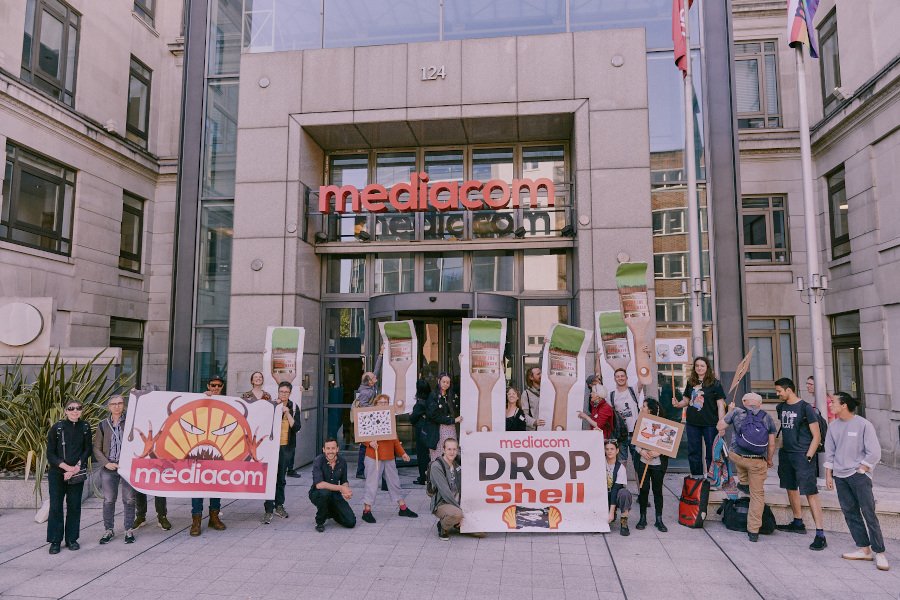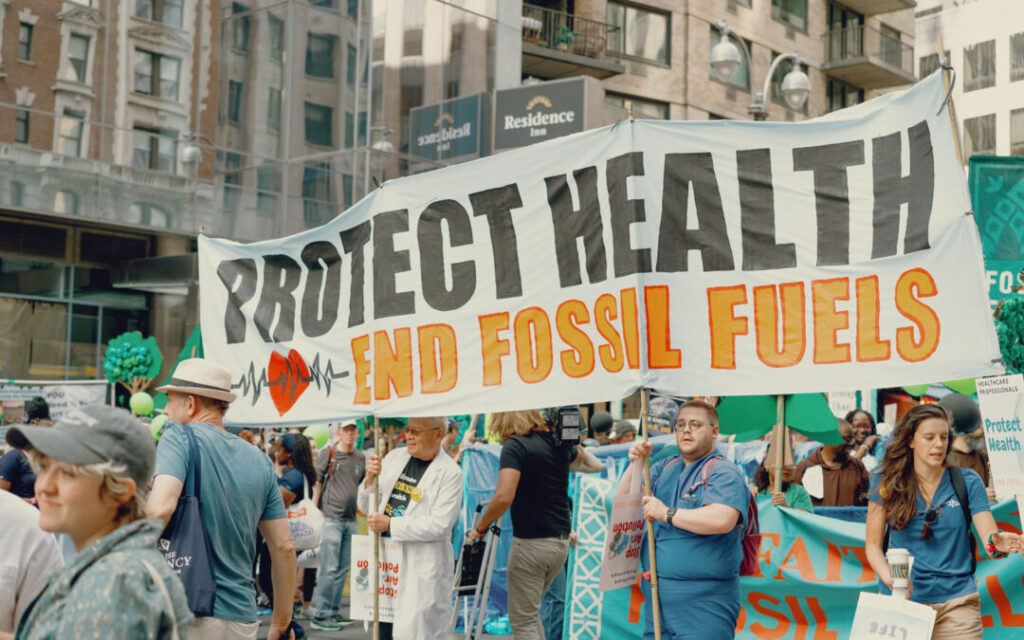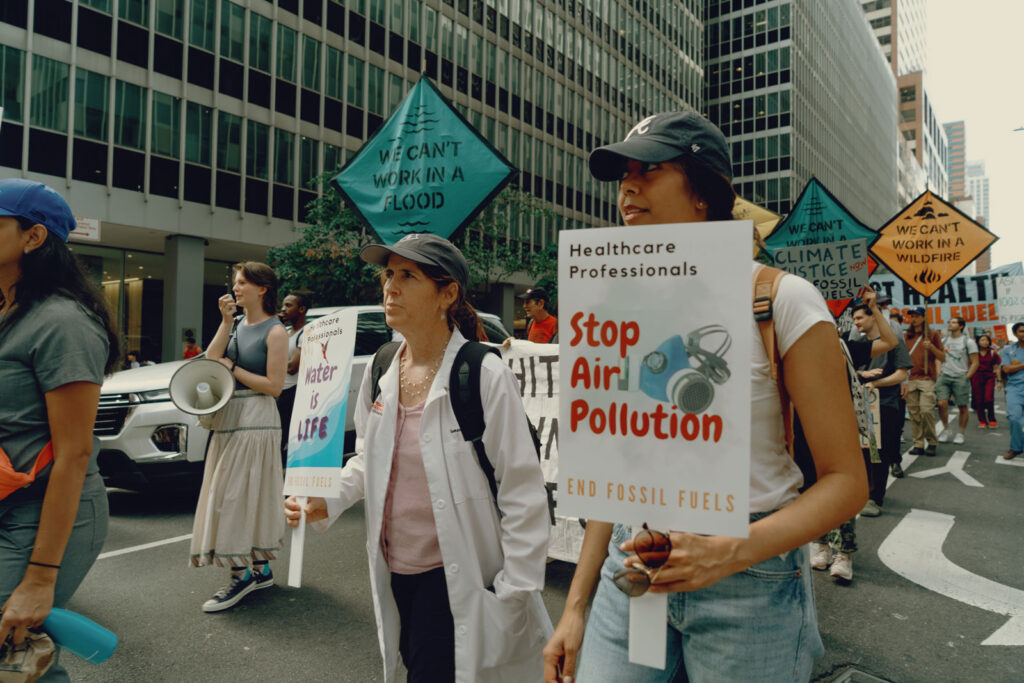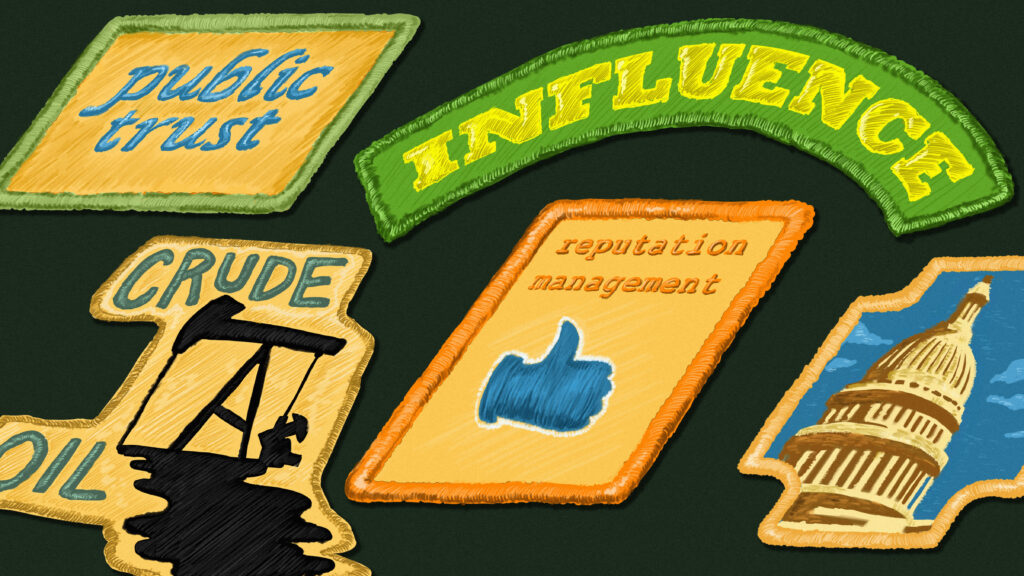Climate campaigners have filed a complaint against WPP, the London-based advertising giant, with the Organisation for Economic Co-operation and Development (OECD), stating that it has violated key corporate guidelines on climate and human rights.
Adfree Cities and the New Weather Institute filed the complaint today with the UK branch of the OECD.
They charge that WPP’s work for major fossil fuel polluters like BP, Saudi Aramco and Shell, along with its work for other heavily polluting industries such as carmakers, airlines, and plastics, makes the company accountable for enabling pollution as well as human rights violations. According to DeSmog’s research, WPP — the world’s largest advertising agency by revenue — also works with TotalEnergies, as well as a number of other oil and gas clients.
“The complaint significantly raises the legal risks for advertising firms,” said Harj Narulla, a barrister representing the climate campaign groups and co-author of the complaint. “By continuing to work for polluting clients, WPP is failing to meet its own environmental commitments and contributing to harm on a global scale.”
The groups filed the complaint at the OECD’s “National Contact Point” in the UK, where WPP is headquartered. The campaigners say this is the first time the OECD has received a complaint against an advertising company.
“While claiming to take the climate crisis seriously, WPP has become the chief propagandist for some of the most polluting corporations on the planet — many of whom are shredding their own, already limited green pledges,” Andrew Simms, co-director of the New Weather Institute, told DeSmog. “This complaint is designed to compel WPP and its subsidiaries to comply with international rules it has signed up to, and the promises and claims it has made.”
Simms and his co-complainants say that WPP must disclose the emissions generated by its work for high-polluting clients, also known as “advertised emissions”; conduct due diligence to prevent damage to the environment and human rights as a result of its business operations; and drop clients not aligned with climate goals.
“All this would just bring WPP into line with what it already claims to live up to,” said Simms.
As of 2024, WPP had more fossil fuel industry contracts — at least 79 — than its major ad industry rivals, according to research by campaign group Clean Creatives.
The complaint referenced two DeSmog investigations that had highlighted WPP’s work for big polluters.
Last July, DeSmog revealed that oil and gas companies had run more than 240 ad campaigns on the London public transport network since the mayor pledged to make the city “carbon zero” by 2030. Freedom of information requests sent by DeSmog showed that BP and Shell — serviced at the time by WPP ad agencies including VML, EssenceMediacom, Grey, Landor, and Mindshare — had specifically targeted Westminster station with adverts containing political messaging.
In October, DeSmog found that a WPP agency headquartered in South Africa called MetropolitanRepublic had enlisted social media influencers to promote TotalEnergies’ controversial East Africa Crude Oil Pipeline, even as anti-pipeline campaigners suffered beatings and arrests by Ugandan police.
The complaint also referenced two profiles of WPP agencies, content marketing agency SJR, and media buying agency EssenceMediacom, featured in DeSmog’s Advertising and Public Relations Database — a freely accessible resource that profiles more than three dozen agencies working to promote oil and gas companies.
WPP did not respond to a request for comment.
‘Enablers to Planetary Destruction’
In a June 2024 address, United Nations Secretary-General António Guterres called on nations to ban fossil fuel advertising, and urged the advertising and PR industry “to stop acting as enablers to planetary destruction. Stop taking on new fossil fuel clients, from today, and set out plans to drop your existing ones”.
In 2022, WPP CEO Mark Read justified such work as supporting oil and gas companies to transition their business models from fossil fuels to clean energy, the trade publication Ad Week reported. In its 2023 annual report, WPP said that its “purpose” was to “use the power of creativity to build better futures for our people, planet, clients and communities.” The company also stated that taking on client work “designed to frustrate the objectives of the Paris [climate] Agreement” went against its internal policy.
UK ad regulators have banned several ads produced by WPP-owned agencies in recent years for making misleading green claims. In 2023, the Advertising Standards Authority (ASA) banned Shell’s “Cleaner Energy” advert, created by Wunderman Thompson (now VML), for giving the impression that it was invested significantly in producing energy from low-carbon sources, which actually made up only a very small portion of Shell’s business.
In 2022, the ASA banned an ad created for UK bank HSBC, a leading financier of fossil fuels, by Ogilvy, for misleadingly portraying the company as doing a lot to fight climate change, while “omitt[ing] significant information about HSBC’s contribution to carbon dioxide and greenhouse gas emissions.” WPP agencies also work with major plastics polluters, including Coca-Cola, Danone, and Nestlé, which together are responsible for 17 percent of branded plastic pollution globally. Experts warn that plastic pollution is creating a global crisis for environmental and human health.
Reporting a company to the OECD triggers a five-stage process, beginning with an initial assessment to determine whether the OECD can accept the complaint. If it does, the OECD may then mediate a discussion between the complainants and the company to reach an agreement.
In 2019, BP stopped running a series of ads after the environmental legal group ClientEarth filed an OECD complaint charging that the ads misled the public by focussing on BP’s low-carbon products, and not the extent of its annual spend on oil and gas.
While OECD guidelines are not legally binding, they are backed by the countries that are OECD members. If WPP were found to be in breach of the guidelines, it could have reputational repercussions.
Paris-based advertising giant Havas acknowledged that its work with fossil fuel clients could harm its reputation in a recent prospectus for its listing on the Dutch stock exchange. The company had faced a backlash since September 2023, when it won a major account with Shell, and four of its agencies lost their B Corp ethical business certification as a result of the deal.
This story was updated on February 12 2025 to include additional material on the contents of the complaint and a more recent figure for WPP’s contracts with fossil fuel clients.
Subscribe to our newsletter
Stay up to date with DeSmog news and alerts







